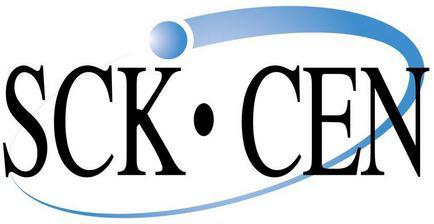Yesterday, I blogged about the search for new radioactive isotopes that might have commercial applications. Belgium is one of five major producers of radioisotopes for medical uses. Annually, almost seven million patients around the globe undergo diagnostic procedures that utilize molybdenum-99 (Mo-99) produced in Belgium.
Mo-99 is produced by bombarding a very pure uranium-235 target with highly energetic neutrons. Mo-99 has a half life of sixty-five hours. It has to be quickly shipped to where it will be used because it decays to technetium-99m which is a metastable isotope of technetium with a half-life of six hours. Metastable means that the nucleus actively emits gamma rays and relaxes into technetium-99 with a half-life of over two hundred thousand years. Te-99m’s short half-life makes Te-99m ideal for injection into patients because it quickly decays into a form which does not emit gamma rays. This minimized overall radiation exposure.
Over a quarter of Belgian medical isotopes are produced at the Nuclear Research Center (SCK-CEN) Belgium Research Reactor Number 2 (BR2) in Mol. These isotopes are subjected to chemical processes by The National Institute for Radioelements (IRE) before they are given to patients. The residue left over from the chemical processing contains various useful elements that can be recovered. These residues are currently being stored in special containers at the IRE’s facility in Fleurus.
The IRE says that the available storage space for these containers of residue will be filled before the end of 2019 if they are unable to move some of the containers to another location. They are taking actions to remedy this such as purchase of additional special containers that will expand storage capacity at the site until 2021.
The RECUMO (Recovery of Uranium from Mo-99 Production) project has been initiated by SCK-CEN and IRE to treat all the residues at the IRE site. The residues will be mixed with low-enriched uranium to dilute them and then purified to produce a low-enriched high-quality material that can then be used. Future residues created by the Mo-99 production process will also be recycled by the RECUMO.
Erich Kollegger is the IRE CEO. He said, “This public-public partnership provides a structural solution for the management of all of the radioactive residues stored at the IRE's site. It will it make possible to recover those substances for other uses, whilst at the same time ensuring that Belgium retains the expertise that is necessary to ensure the safe management of this nuclear legacy. It also confirms our excellent relationship with SCK-CEN, which we have nurtured for many years now.” Eric van Walle is the Director-General of the SCK-CEN. He said that there would be new advanced infrastructure created in Belgium for the partnership. It will create many long term jobs.
The SCK-CEN and the IRE commented on their partnership today. One of the features of the RECUMO project serves the commitment of Belgium to nuclear nonproliferation. The partnership of the two organizations will be implemented in collaboration with the Directorate-General for Energy of the Federal Public Service Economy, SMEs, Self-Employed and Energy, and under the supervision of Belgium's Federal Agency for Nuclear Control.
